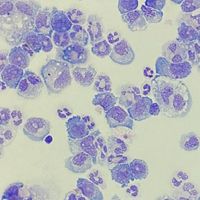Improved Immunity After SARS-CoV-2 Variant Exposure
The COVID-19 pandemic started in 2020, and as society is still recovering, scientists and researchers are trying to stay on top of the multiple variants emerging. Although the pandemic occurred four years ago, the virus is still not completely eradicated and is not likely to go away. However, researchers are investigating the lasting impact of COVID-19 on our bodies. Scientists are proposing that COVID-19 is changing our immune system. More specifically, our bodies are evolving to better combat the different SARS-CoV-2 variants.
A recent article published in Science Immunology by Dr. Eui-Cheol Shin and his group demonstrated that immune exposure to the omicron variant results in improved immunity from other variants. Shin is currently a professor at the Korea Virus Research Institute Center for Viral Immunology and has been investigating the immune response after omicron variant exposure. Shin and his team determined that immune T cells responsible for lysing or killing infected cells are better at fighting other COVID-19 variants after exposure and successful defense against the omicron variant.
The omicron variant was highly transmissible and became a dominant SARS-CoV-2 strain in 2022. Multiple variants from the initial omicron virus emerged including BA.1, BA2, BA.4/BA.5, BQ.1, XBB strains, and JN.1 strains. The rapid development of new strains makes infection control difficult and leads to increased infection among populations. Exposure to a disease allows your body to generate a memory immune response through memory T cells. In this case, your body will recognize a pathogen that it was previously exposed to and lyse the infection before it turns into a severe disease. This is the reason when you get sick a second time with the same disease, the symptoms are usually minimal or non-existent. Vaccines work similarly in which you purposely expose your body to an attenuated disease to build antibodies and a memory immune response to better protect you in the future.
Shin and his team wanted to determine what occurs in the immune system after being exposed to an omicron variant even after vaccination. In their experimental design the researchers took patients that successfully overcame the BA.2 omicron variant and analyzed their memory T cells. The team wanted to see how the T cells responded to other variants. Therefore, the isolated memory T cells were subject to different variants in a dish and the proteins and anti-viral activity from the T cells were measured. The results showed that the memory T cells with prior BA.2 variant exposure had heightened activity against other variants including BA.4 and BA.5. This result indicated that successful immune response to the BA.2 omicron variant strengthens the immune system toward other variants.
Shin and others concluded that this discovery of improved immunity and understanding of how memory T cells are enhanced through SARS-CoV-2 exposure improves our knowledge of immune biology. As a result of successful immunity toward an omicron variant, future exposure with other variants will unlikely cause major health issues for the patient. The findings suggest that our immune systems are evolving to combat future strains. In addition, this knowledge can help facilitate optimal vaccine development by finding common similarities among strains to improve memory T cell activity. Overall, this work has major implications for emerging vaccinations in response to new SARS-CoV-2 variants and has the potential to save lives.
Article, Science Immunology, Eui-Cheol Shin, Korea Virus Research Institute Center for Viral Immunology








